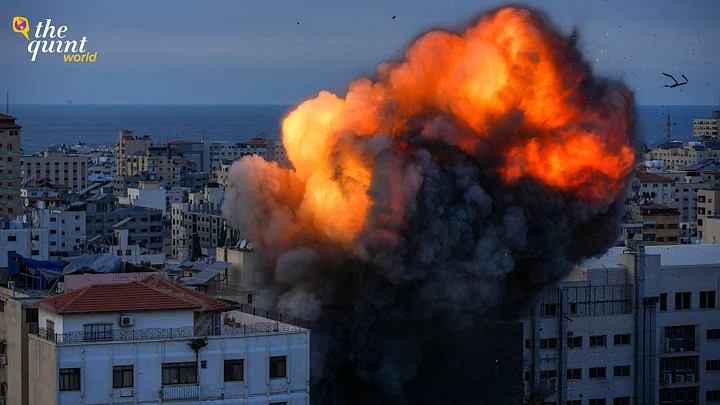On 7 October 2023, the Palestinian Islamist group Hamas unleashed its most devastating attack on Israel in decades.
An unanticipated attack was launched at dawn during the Jewish holiday of Simchat Torah in Southern Israel. Hamas gunmen massacred and abducted hundreds of civilians and soldiers, and launched thousands of rockets towards places as far as Jerusalem, triggering Israel to conduct massive retaliatory air strikes that killed dozens in the Gaza Strip.
People in Gaza immediately stocked up on food, and most of the enclave ended up sinking into darkness due to a lack of electricity.
Gunfights erupted in more than 20 Israeli cities, killing at least 1000 people on both sides and injuring thousands more. “We announce the start of Operation Al-Aqsa Flood, and we announce that the first strike, which targeted enemy positions, airports, and military fortifications, exceeded 5,000 missiles and shells,” Mohammed Deif, head of Hamas' military wing, said in a recorded message.
According to the Israeli military, the militants stormed into Israel by land, sea, and air.
Following a temporary halt in rocket launches, Palestinian militants launched an evening onslaught on Israeli towns and cities in the country's central heartland, setting off red alert sirens and sending thousands of Israelis running for safety. Prime Minister Benjamin Netanyahu announced the mobilisation of Israeli military reservists and said, "We are at war, and we will win it."
Secrecy and Coordination: Hamas' Blitzkrieg
Hamas was founded as a Sunni Islamic militant group during the first intifada (1987) to liberate Palestine and annihilate Israel to establish an Islamic state. Hamas has frequently engaged in multiple attacks and suicide bombings of varying intensity with the help of regional players on Israeli soldiers and civilians.
In the past, the group has attacked Israel with short-range and medium-range missiles and demonstrated brutality by attacking civilians, which is considered a ‘crime against humanity’. The present attack is unprecedented in death and destruction, and is perhaps the worst security crisis in decades.
This time, Hamas has launched a highly coordinated attack, hitting military bases and killing and taking hostage soldiers and civilians, which is similar to the 1973 Yom Kippur attack by Egypt and Syria due to its surprise element.
It seems that Hamas had planned and prepared themselves for months before this massive attack. The involvement of an external player (regional or global) in the coordination and supply of weapons to Hamas can not be ruled out at this juncture after looking at the intensity and secrecy of the attack.
The spokesman for Hamas, Ghazi Hamad, told BBC that Hamas has Iran’s support to conduct surprise attacks against Israel and “it’s a source of pride”. A closer look at the incidents reflects Israel’s intelligence agency’s failure to detect a serious security threat.
The former chief of Mossad (an Israeli Intelligence agency), Efraim Halevy, told CNN: “We had no warning of any kind, and it was a total surprise that the war broke out this morning.” It is too early to draw conclusions, but Israel’s lack of preparedness is visible in the first eight hours of the attack, which caused three digits of casualties to Israelis in one day, something that has never happened since 1973.
On Iran's (and Hezbollah's) Involvement
Iran’s assistance in attacks has profound repercussions for the West Asian region. The tensions may escalate rapidly, as Iran is the biggest regional threat to Israel in West Asia. Qatar, Kuwait, Syria, and Lebanon’s Hezbollah have all supported and praised the Hamas attack and blamed Israel for the current situation.
Saudi Arabia, UAE, Oman, Egypt, and Morocco expressed deep concern at the deteriorating situation and asked international communities and organisations to activate a credible peace process. The involvement of Iran suggests that the motive of the attacks may be related to the ongoing Saudi-Israel peace negotiations as well.
Iran has consistently opposed the normalisation of ties with Israel. Saudi Arabia, a leader of the Muslim world, advocates the Palestinians’ cause while being engaged in negotiations with Israel.
At the same time, Iran has an opportunity to demonstrate that it is the real leader of Muslim countries by sailing on the Palestinian cause. The geopolitical stakes of each country in the region are high, which may have an adverse effect on the region. The war may even affect the recent rapprochement deal between Riyadh and Tehran.
Academicians and policy analysts from all over the globe anticipated a diminution in regional hostilities after China brokered the Saudi-Iran peace deal. However, the Hamas attack has surprised them all.
The break-in of Hezbollah on the second day gives a new turn in this attack. Tensions have escalated on the Israel-Lebanon border, where Hezbollah launched multiple rockets at Israel-occupied Shebaa Farms.
In a written statement, Hezbollah said the attack targeted three sites, including a "radar site" in the Shebaa Farms, a piece of land controlled by Israel since 1967 that Lebanon claims as its own. The Israel Defence Forces(IDF) retaliated by attacking Hezbollah posts in Lebanon. The possibilities of further escalation and multi-front war are highly anticipated, which may bring International players to the court.
After this Medieval-styled brutal attack by Hamas, Palestinians may not be seen again as helpless victims and may have everlasting effects in West Asia.
With this war, the talks regarding a two-state solution or the possibility of co-existence of the Israelis and the Palestinians may die forever. The war of existence between the Jews and Palestine may be fought according to famous tribal Arab rule: either kill or get killed.
(Anjali Singh is a Postgraduate student of political science and international relations, and has worked as a Research Intern at the Indian Council of World Affairs in New Delhi. Anmol Kumar holds a Postgraduate degree in Politics and International Relations from Pondicherry University. This is an opinion piece. The views expressed above are the author’s own. The Quint))
